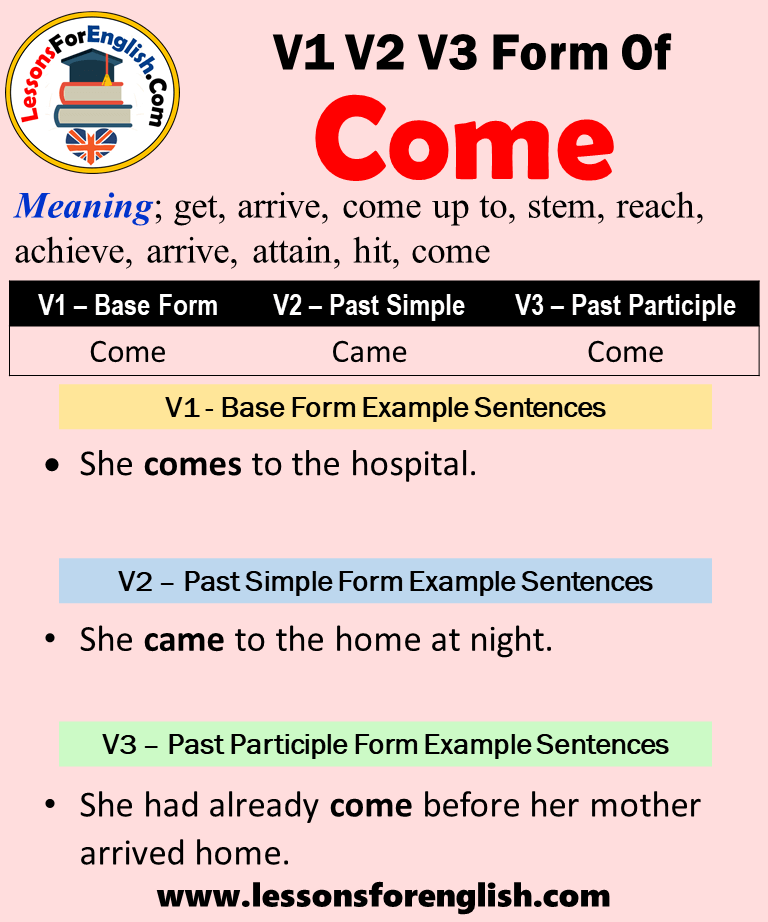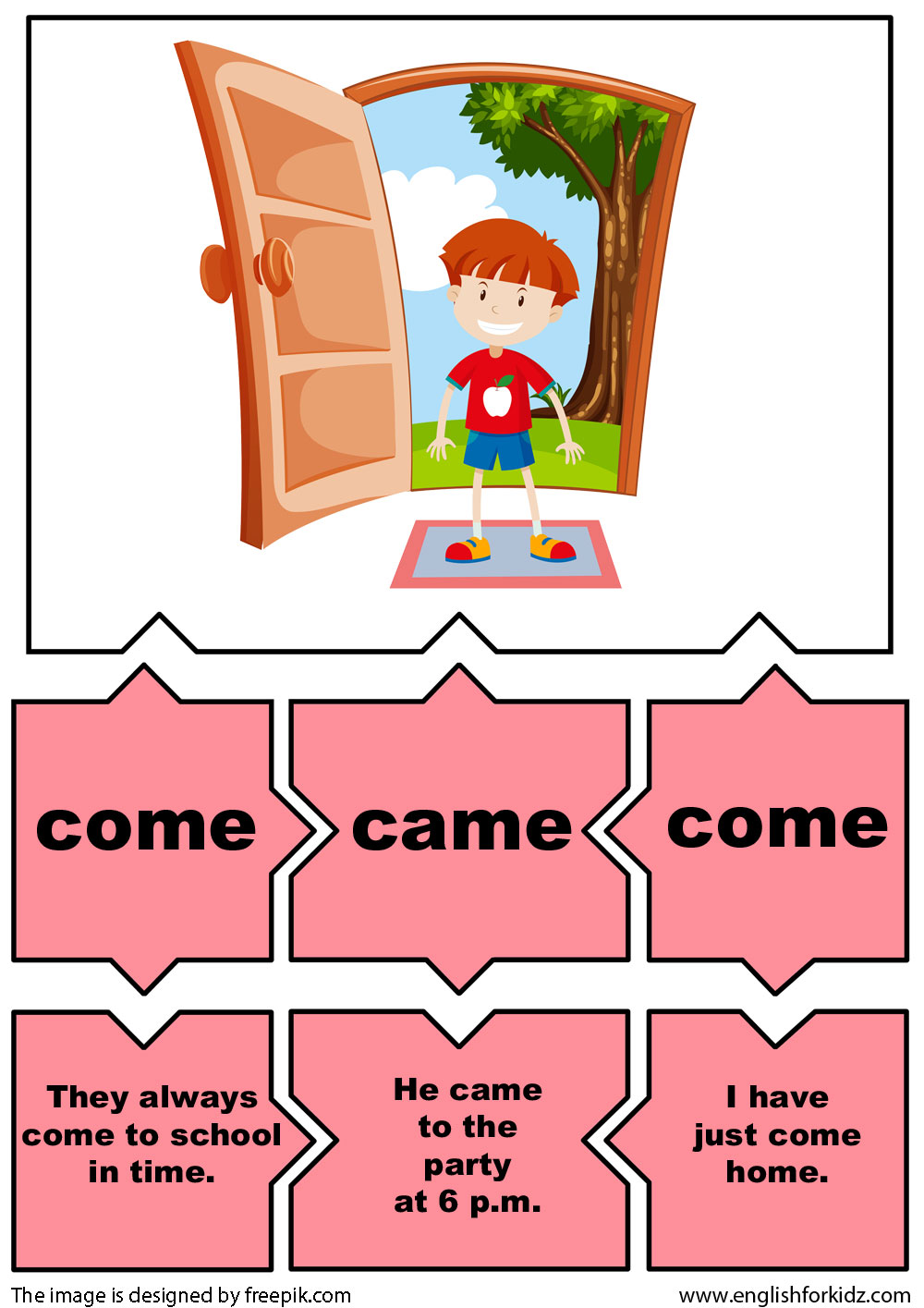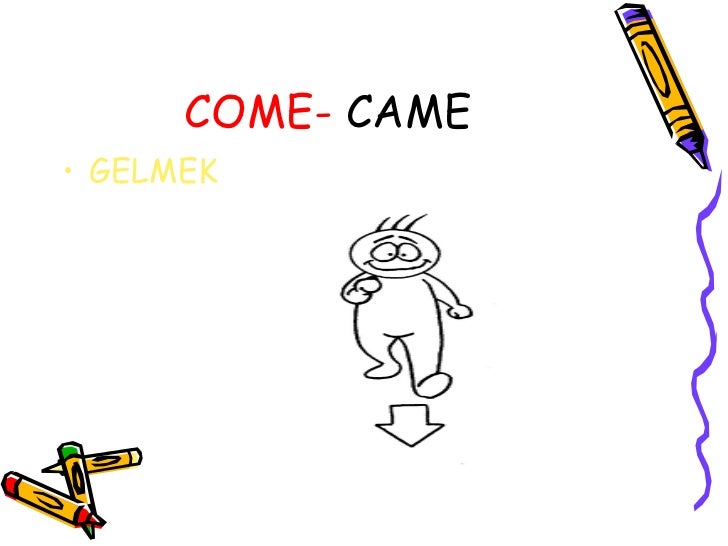
Past Tense Of Come, Past Participle Form of Come, Come Came Come V1 V2 V3 Lessons For English
Conjugación verbo come - inglés X Inglés Conjugar Herramientas: Modelos Inglés británico y americano Verbos auxiliares y modales Verbos irregulares come venir; ir; llegar;. Infinitive to come Preterite came Past participle come Modelo : come Auxiliar : have, be Otras formas: not come Contracciones Publicidad Indicative Present I come you come

Come Past Simple, Simple Past Tense of Come, V1 V2 V3 Form Of Come Come means move or travel
Photo: Ken Cedeno/Reuters. The management philosophy known as DEI, which had gathered momentum since 2020, has been under siege over the past year amid a collision of legal, economic and.

Irregular verbs презентація з англійської мови
Noun ( en noun ) A grooved strip of lead used to hold panes of glass together. Statistics

Verbs Irregular 2
come 1 of 2 verb ˈkəm came ˈkām ; come; coming ˈkə-miŋ Synonyms of come intransitive verb 1 a : to move toward something : approach Come here. b : to move or journey to a vicinity with a specified purpose Come see us. Come and see what's going on. c (1) : to reach a particular station in a series Now we come to the section on health. (2)

Come Came Come неправильные глаголы
At last, the time came to leave. When the moment actually came, I began to feel a little nervous. He wanted to be buried beside her when the time came. The time had come to let a younger person lead the party. The high point of the concert came during the drum solo. Come November, the high-season horror of traffic jams subsides.

What Are Verbs Came, Coming" Verb Quiz English Grammar Lessons YouTube
CAME definition: 1. past simple of come 2. past simple of come 3. past simple of come. Learn more.

Irregular Verbs Puzzle Flashcards (Part 1)
Grammar Reference Irregular Verbs List Definition: To Come Irregular verb: To Come Verb conjugation: Come - Came - Come Meaning of 'To Come' To move towards or to arrive at a specified place, time or situation Conjugation of verb 'Come' Irregular Verbs Following a Similar Pattern Verbs like: Subscribe to Ad-Free Browsing

Kids Box 4 Unit 5 Verbs Baamboozle Baamboozle The Most Fun Classroom Games!
Irregular verb: come - came - come Indicative | Conditional | Imperative | Infinitive | Participle Indicative Present I come you come he come s we come you come they come Present continuous I am com ing you are com ing he is com ing we are com ing you are com ing they are com ing Preterite I came you came he came we came you came they came

The come Song YouTube
Come or Came - Basic English Grammar JForrest English 699K subscribers Subscribe Subscribed 1.2K Share 35K views 3 years ago Basic English Grammar In this basic English grammar lesson,.

Презентація "Irregular verbs. 3 forms"
Chris Low details how Alabama's Nick Saban came to the decision to retire from coaching football. (2:33) ESPN News Services. Jan 10, 2024, 05:16 PM ET. While his time as our coach may have come.
Транскрипция неправильного глагола to come comes came come coming произношение примеры
Is It Ever Correct To Use "Have Came"? So, what about that elusive third form? "Have came" has been mentioned, but all we've said about it is that it's incorrect. Unfortunately, that's all there really is to say about it. "Have came" is never correct, and you should avoid using it.

Phrasal Verbs with COME English Study Here
Conjugation verb come X English Conjugate Toolbox: Models British vs. American English Auxiliaries, modals Irregular verbs come turn; happen; arrive;. Infinitive to come Preterite came Past participle come Model : come Auxiliary : have, be Other forms: not come Contractions Advertising Indicative Present I come you come he/she/it comes we come

Come or Came Basic English Grammar came comeเพิ่งได้รับกา
'Come' is used in the case of Past Perfect Tense or Present Perfect Tense. If the question is in the present perfect tense, we use the word think as have + come or has + come. The subjects I, you, we are used as 'have + come'. The subjects he, she, it, are used as 'has + come'.

Aula de Inglês 76 Come Came came comeล่าสุด
Come or Came? January 7, 2023 Come is the present tense and past participle form of the verb. Came is the past simple tense of come. Last updated on October 30th, 2023 at 01:22 pm The verb come in text convo. By Gflex on Canva. Contents What's the past tense of come? Came or come? Forms of the verb come Is come a regular or irregular verb?

Irregular Past Verb Forms
1. "Came" Is The Past Tense Of "Come". When referring to an action that happened in the past, use "came" if the subject is not the speaker or the listener. For example, "She came to the party last night.". 2. "Come" Is The Present Tense Of "Came".

40 Phrasal Verbs with COME in English • 7ESL
1. intransitive verb. When a person or thing comes to a particular place, especially to a place where you are, they move there. Two police officers came into the hall. Come here, Tom. We heard the train coming. The impact blew out some of the windows and the sea came rushing in.